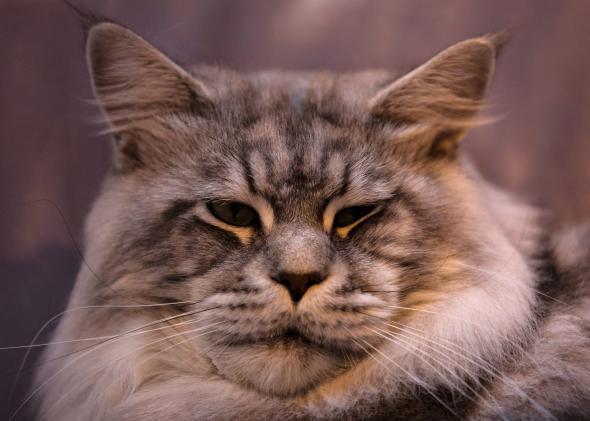The other day, while tearing about in a pre-feeding frenzy, my sweet cat Callie (a calico, of course) ran into my foot—hard—as I was stepping forward to crack open a can of Saucy Seafood Bake. She looked shocked for a second, then hid. And my soul wailed: “I’m a terrible cat mom.”
And then I snapped out of it, realized that the adorable little chucklehead did it to herself, and that I’m not a cat mom. I’m a cat owner, even if at times it seems like my two felines rule the household.
But Big Pet wants to change that. Companies are pushing the phrase “pet parent,” and it needles me as much as Callie’s (not-declawed) paws when she’s kneading my stomach. Take, for instance, this commercial from Blue Buffalo pet food, which seems to be on TV constantly:
I want to scream: Stop trying to make “pet parent” happen.
But it’s already happening. A survey found that 76 percent of dog owners preferred to be called “dog parents” or “pet parents.” (That survey was commissioned by the dog-sitter search site Rover.com, so I hope and trust that the numbers are inflated.) Much as I hate to put down my fellow animal lovers, these people have been indoctrinated.
The American Pet Products Association estimates that total U.S. spending on pets will top $55 billion this year. That’s almost double the amount shelled out in 2001. To maintain that kind of growth requires the sale of more (and more expensive) pet foods, cat trees, and manicures. To sell additional outdoor habitats for indoor cats apparently requires owners to feel as emotionally and financially invested in their furry cuddlebugs as real parents are in their children.
Some vets ask new customers whether they consider their animals part of the family. Presumably, embracing that designation—and you look like sort of a jerk if you don’t—signals that you are willing to spend a lot of money on your animal. (Of course it’s every pet owner’s responsibility to ensure that her furball is healthy and pain-free, and I believe that most vets are likewise more concerned about their patients’ well-being than profit. Vet school is not exactly the place to go to become wealthy. But there is certainly some upselling in the biz.)
Perhaps the most egregious attempt to push pet parenting is Pet Parent’s Day, a made-up holiday to end made-up holidays. It was founded in 2008 by Veterinary Pet Insurance, which is owned by Nationwide. The festivities take place on the last Sunday of April. Just in for heartworm season! VPI makes the case for the holiday with this tongue-bath for pet owners:
For those who tirelessly scoop poop, dish out kibble and share a cramped bed with four paws, this day is for you.
You’ve planned birthday parties for Fido, bought specially-formulated oatmeal shampoo that costs more than your own, and made a point to stroll down the pet aisle every time you shop at the convenience store.
You might even plan vacations that include your pet, or make a point to carve out a couple of hours a day for playtime at home, a dog park or even the beach.
Devoted pet parents like you deserve more than a pat on the back—celebrate Pet Parent’s Day® and bond with your pet this weekend.
I tirelessly scoop poop, dish out kibble, and share a cramped bed with eight paws, and I think that this is daft. If you are so exhausted from caring for your pet that you believe you “deserve” a special weekend to “bond with your pet,” you may want to reconsider your approach.
As dog blogger Christie Keith wrote in 2010:
Calling me a “pet parent,” and even worse, calling dog training “pet parenting,” may be questionable in any number of ways, but above all, it lacks authenticity. “Pet parent” is the language of the marketer, of the ad campaign designed to sell you pet food and drugs and services by implying that doing “less” for your pets than your children means you don’t really love them.
I don’t have children yet, so my two cats receive excessive amounts of love and care from both my husband and me. They sleep with us each night, and we discuss their personalities and interactions at length. I care deeply about their comfort and happiness. (Don’t tell me cats can’t feel happiness. I’ve seen Callie after a cuddle session.) We build part of our lives around them. Though a real Christmas tree would be nice, I don’t trust my cat Goose around one. (But if we had one and she started climbing it, I’d be smart enough to put down the camera before too much havoc was wrecked.)
But that isn’t parenting. Parenting prepares a human being to live and thrive in the real world without the constant guidance of a mother or father. Ideally, the person should, unlike my cats, be able to answer nature’s calls without anyone else having to clean it up. Yeah, some cats can use the toilet, but mine will never be that self-sufficient. They will be indolent and indulged, dependent on my husband and me, for the rest of their days. It is a two-way relationship: They give me unconditional affection, comfort, and warmth when I just can’t deal with humans any longer. But that isn’t a parent-child relationship. It’s a pet-pet owner relationship.
I may do the bidding of Callie and Goose. But I still own them.
